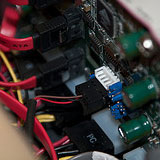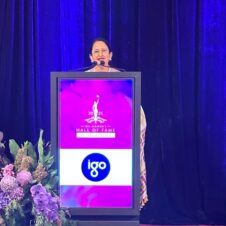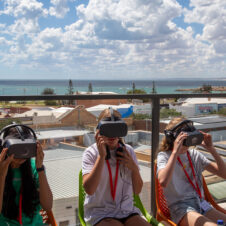The amount of computer data generated by the entire world in a whole year will need to be stored in a single day for the world’s most powerful telescope − the Square Kilometre Array (SKA) − and the International Centre for Radio Astronomy Research (ICRAR) is gearing up to meet that unprecedented need.
ICRAR scientists say the $2 billion SKA will generate one exabyte of data − a million terabytes (or one quintillion bytes) – every day while it searches the sky with the power to detect airport radars in other solar systems 50 light years away.
ICRAR− a joint venture between Curtin University and The University of Western Australia − has signed an agreement with DataDirect Networks to develop the extraordinary new data storage capability.
ICRAR Director Peter Quinn said preparatory work for the SKA − for which Australia/New Zealand and Southern Africa are bidding − was “bringing together some of the world’s leading minds to figure out how to solve the data deluge”.
Professor Andreas Wicenec, ICRAR’s head of computing, said DataDirect Networks were world leaders in the type of high-performance computing data storage required for a new era of advanced radio astronomy.
DataDirect Networks’ experience would flow into storage for the SKA through work on the Australian precursor radio telescopes, the Murchison Widefield Array (MWA) − due for completion at the end of this year − and the Australian SKA Pathfinder (ASKAP) which would be ready at the end of 2013.
“Combining DataDirect Networks’ expertise in providing ultra high-speed access to large amounts of data with our experience in how astronomers need to access their material gives us the opportunity to develop the best solution,” he said.
Signing of the agreement followed last week’s installation at UWA of a new Fornax supercomputer − 10,000 times faster than an average office desktop computer − to help drive ICRAR’s powerful new radio telescopes.
ICRAR is also preparing to develop a low-frequency component of the SKA − dubbed “SKA-low” − which, unlike the SKA’s high-frequency collecting “dish” antenna array, consists of new electronic antennas with no moving parts.
Professor Peter Hall, ICRAR Deputy Director responsible for engineering, said telescopes of SKA-low’s design were a relatively recent development in radio astronomy.
ICRAR has just signed an agreement with scientists from organisations in Europe, India and the UK to form a collaboration for the development of SKA-low, which would form a significant part of the SKA project.
“Another benefit of our role in this collaboration is more opportunity for Australian industry to be involved in the SKA, regardless of where it is sited,” Professor Hall said.
He said ICRAR was working closely with the Australasian SKA Industry Consortium to ensure Australian enterprises had maximum opportunities to tender for construction work.
An announcement on Australia’s bid for the SKA − a continent-wide Australasian project with radio telescope sites that that extend to New Zealand − is expected to be made by the international SKA Board in London in April.
Contact for comment:
Professor Peter Hall
Deputy Director responsible for Engineering | ICRAR
Email: peter.hall@icrar.org – Mobile: +61 400 801 531
Professor Andreas Wicenec
Head of Computing | ICRAR
Email: andreas.wicenec@icrar.org – Mobile: +61 431 832 602
Kirsten Gottschalk
Media Contact | ICRAR
Tel: +61 8 6488 7771 – Mobile: +61 438 361 876 – Email: kirsten.gottschalk@icrar.org
Michael Sinclair-Jones
Media Manager | The University of Western Australia
Tel: +61 8 6488 3229 – Mobile: +61 400 700 783 – Email: michael.sinclair-jones@uwa.edu.au


